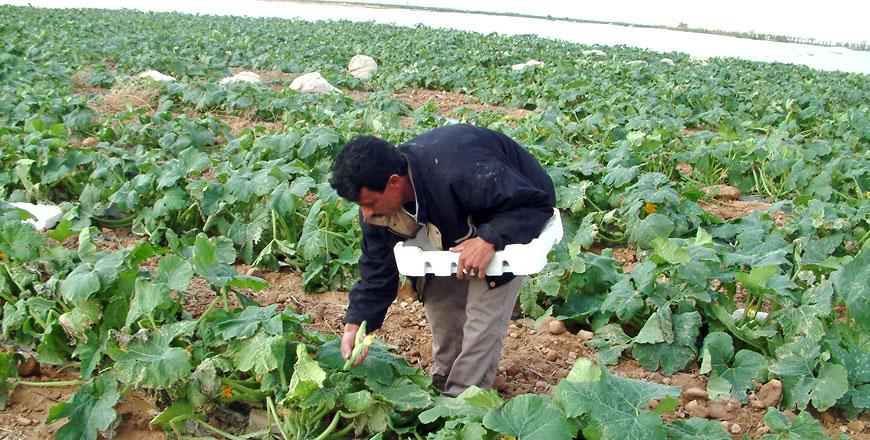You are here
Agriculture sector leaders decry new guest worker permit fees
By Hana Namrouqa - Feb 10,2017 - Last updated at Feb 10,2017

Agricultural sector leaders warn that raising the cost of work permits will harm farmers (JT file photo)
AMMAN — A new government decision unifying guest workers’ permit fees has created a sense of disappointment among different segments of the agriculture sector, who deplored that policymakers are "wiping out" farming in Jordan.
Farmers are abandoning their land, their representatives said on Thursday, warning that the gradual trend will increase reliance on importing basic produce, jeopardising the Kingdom's food security.
Additional financial burdens on farmers, coupled with the absence of marketing portals for their produce, is forcing them out of the sector and leaving the door open for the import and monopoly of basic food items, they pointed out.
Jordan Farmers Union President Mahmoud Oran said that any additional fees and taxes on the agriculture sector will negatively impact producers and consumers alike.
"The new fees raise production costs on farmers, who have already been struggling for a decade now to market their products," Oran said.
When the marketing of fruit and vegetables fails, agricultural produce will pile up and prices will drop, with farmers incurring financial losses, he noted.
Farmers are clients of banks and agricultural loaning corporations, Oran said, underscoring that when they fail to sell their products, they face hardships in paying back their debts.
"… And that's why many farmers are abandoning cultivation," he pointed out.
As farmers stop cultivating, importers will take advantage and monopolise prices of basic food products, Oran said.
He added that the government was planning to unify the guest labourers' fees at JD500, but following farmers' rejection, it decided to cut down the fees to JD300.
Before the latest decision, work permits used to cost employers anything from JD180 to JD700, depending on the sector. The government said that the decision seeks to streamline the market.
Jordan Agricultural Engineers Association President Mahmoud Abu Ghneimah said that hundreds of dunums of land remain unplanted in the Jordan Valley this season.
"Around a third of the valley's land was uncultivated this season. If marginalisation of farmers and their interests continues, I expect that half of the valley's land will not be planted by the end of this year," Abu Ghneimah told The Jordan Times.
The unionist said that it is the government's right to control the labour market, but this should not be done at the expense of the agricultural sector.
"The goal of the government should always be supporting agriculture in Jordan because the country's food security depends on it," Abu Ghneimah said.
Unifying guest workers’ permit fees comes after the Labour Ministry announced in June last year that it had stopped the recruitment of new guest workers in an effort to regulate the labour market and study the number of guest workers in Jordan.
The decision raised the ire of all segments of the agriculture sector, with the government later granting exceptions for the sector.
There are around 1.4 million guest workers in Jordan, a million of whom are illegal, according to Labour Ministry figures.
By Sunday, the ministry said it had issued around 400,000 work permits, noting that the workers who have those permits make annual remittances of around $1.5 billion, which constitute half the remittances that come from Jordanians working abroad.
Jordan Valley Farmers Union President Adnan Khaddam said that raising and unifying the fees of guest labourers is not the solution to control foreign labour, noting that farmers are the most affected by the decision.
The issue of guest workers with permits to work in agriculture who move illegally to other sectors should not have been resolved at the expense of farmers, Khaddam told The Jordan Times.
"The government should have announced stricter penalties against violators, be they farmers or employers."
Related Articles
AMMAN — Representatives of the agriculture sector on Tuesday held a sit-in in front of Parliament in Abdali to protest a new government deci
AMMAN — The Jordan Valley Farmers Union (JVFU) on Tuesday announced the continuation of the recruitment of foreign workers in the agricultur
AMMAN — The Ministry of Agriculture on Sunday announced plans for allowing the recruitment of new foreign workers in the agricultural sector

















